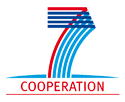

ICT-2009-247473
SmartCoDe Kick-Off
Published: Thu, 2010/02/25
Found at: Pressebox
Contact Person:
EU Project SmartCoDe to Develop Local Energy Management Infrastructure with Minimal Consumer Cost Project Supports European Union’s "20% Renewable Energy by 2020" Objective
Hannover, Germany - February 22nd 2010 - edacentrum GmbH, today announced the launch of the European Union (EU)-funded Project SmartCoDe. The project’s objective is to enable the intelligent management of local energy grids that consist of renewable energy sources such as wind turbines and photovoltaics; energy consuming systems such as lighting, heating, ventilation, and air conditioning (HVAC), appliances such as refrigerators, ovens, and even the battery charger of an electrically-powered vehicle. The project aims to develop the fine-grained communications infrastructure, control and monitoring devices, and associated software, required to meet a consumer price point of less than three Euros per managed device - a level at which surveys indicate consumer willingness to adopt the technology en masse. Successful fulfilment of the project’s goals would lend considerable support to the EU’s objective of deriving 20 percent of its energy from renewable resources by the year 2020.
SmartCoDe could significantly cut standby energy consumption by up to 10 percent, while residential demand side management could reduce energy consumption by up to 16 percent. This compares very favourably with the 10 percent to 30 percent savings achieved by today’s energy management approaches, which are cost-effective only in single, high-consumption commercial sites.
Prof. Dr. Christoph Grimm, SmartCoDe scientific coordinator at the Technical University of Vienna, said "The outcome of this ‘think globally, act locally’ project will reduce overall energy intensity and simultaneously enable residences and small commercial premises to profit from an open European electricity market. Moreover, it would further consolidate Europe’s position in information and communication technologies".
On the demand side, SmartCoDe aims to schedule the use of energy or to switch energy using products (EuP) into standby, where customer requirements permit. A SmartCoDe system would thus enable individual consumers to participate in the energy market as an intelligently-managed "sub-grid".
On the supply side, SmartCoDe’s smart energy management is intended to mitigate or even eliminate local energy grids’ unpredictability of supply - an unpredictability that mandates the continued use of the main grid to guarantee supply, especially during peak periods. A significant increase in the predictability of supply would allow local energy grids to participate in the energy market as both consumers and reliable energy suppliers.
Peter Neumann, SmartCoDe overall project coordinator at edacentrum, said "Current energy management approaches are designed for big producers and big consumers. With an energy management cost of hundreds of Euros per managed device, these approaches are out of the question for residential and small commercial needs. The SmartCoDe project aims to reduce the cost of management to a tiny fraction of what it is today".
In addition to the consumer cost factor, SmartCoDe’s energy management device is intended to meet three other criteria critical to the successful deployment of advanced energy management techniques in consumer environments, namely:
- A small form factor that integrates readily into as many types of household appliance as possible.
- A wireless communications infrastructure that enables communication and co-ordination between all energy sources, allowing sources to "announce" their availability.
- High-grade data security akin to that of "SmartCard" technology.
SmartCoDe is a 7th Framework Program (FP7) project funded by the European Commission. Its primary mission is to balance and reduce the energy consumption of small buildings and neighbourhoods and pave the way to energy-neutral / energy-positive local grids. The project, which commenced in January 2010, is a three-year Specific Targeted Research Project (STReP) funded under the programme "ICT-2009", in the area "ICT support to energy-positive buildings and neighbourhoods". It includes eight partners from five European countries, with the following responsibilities:
- Ardaco, a.s., Slovakia: Secure data transmission, secure communication
- edacentrum GmbH, Germany: Project coordination, dissemination of results, web portal
- ennovatis GmbH, Germany: Energy management systems
- Infineon Technologies Austria AG: System integration, system-on-chip (SoC), system-in-package (SiP)
- Quiet Revolution Ltd., U.K.: Small-scale energy generation (wind turbines), energy forecasting
- Tridonic Atco GmbH & Co KG, Austria: Lighting and building automation
- University of Novi Sad, Serbia: Energy management software
- Vienna Technical University, Austria: Modeling and design of wireless sensor networks
The team’s deliverables - which should be complete by the end of 2012 - include:
- Advanced power management methodology
- Abstract models of a local energy cluster, EuP, and decentralised wind turbine
- Executable specification and architectural models of the energy management device (SoC/SiP)
- SmartCoDe demonstration
- Energy (wind) generation forecasting methodology
For more information, please see http://www.fp7-smartcode.eu/
About edacentrum
edacentrum is an institution dedicated to promote electronic design automation (EDA) research and development funded by the BMBF (Federal Ministry of Education and Research). It initiates, evaluates and supervises industry-driven R&D projects and offers a comprehensive spectrum of services on all matters concerning EDA, particularly project management of R&D projects. By encouraging EDA cluster research projects and EDA networks, it cross-leverages and reinforces the EDA expertise of universities and research institutes.
edacentrum provides a communication platform for the EDA community; it seeks to inform upper management, the public and the political arena about the central importance of design automation for solving complex system and semiconductor problems, especially those associated with nanoelectronics.
